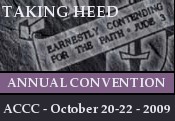"My guess is that most of these guys like to doubt because being unsure of all things at all times guarantees they will never have to stand up for anything or risk offending anyone."
Body
Discussion
Is the emergent/emerging church movement dying... already?
Body
Phil Johnson thinks so. “You wonder why I’ve hardly posted anything about Emergent/ing Christianity for the past year? The movement has been self-destructing nicely without any help from me.”
Discussion
Theological Reflections: the Penal Substitutionary Atonement
 Does God allow doctrinal problems in the church so that Christians will study God’s Word carefully and defend it more accurately against unbiblical ideas? Maybe so. There does seem to be some evidence of this in church history. But whether this is true or not, it does seem that several serious doctrinal deviations have arisen in our generation—one after another—even within what has been considered generally conservative Christianity. From the fifties on, evangelicals debated among themselves the doctrine of the inerrancy of the original writings of Scripture. In response to those evangelicals who were arguing that Scripture was not inerrant in the scientific and historical sections of Scripture, the International Council on Biblical Inerrancy was formed in 1977. These biblical scholars planned a ten-year strategy of education, study, and publication. Over the course of ten years, they and others published several important and helpful books, along with the notable Chicago Statement on Biblical Inerrancy. The battle is not over, but much has been accomplished through careful biblical responses to those compromising the doctrine of Scripture.
Does God allow doctrinal problems in the church so that Christians will study God’s Word carefully and defend it more accurately against unbiblical ideas? Maybe so. There does seem to be some evidence of this in church history. But whether this is true or not, it does seem that several serious doctrinal deviations have arisen in our generation—one after another—even within what has been considered generally conservative Christianity. From the fifties on, evangelicals debated among themselves the doctrine of the inerrancy of the original writings of Scripture. In response to those evangelicals who were arguing that Scripture was not inerrant in the scientific and historical sections of Scripture, the International Council on Biblical Inerrancy was formed in 1977. These biblical scholars planned a ten-year strategy of education, study, and publication. Over the course of ten years, they and others published several important and helpful books, along with the notable Chicago Statement on Biblical Inerrancy. The battle is not over, but much has been accomplished through careful biblical responses to those compromising the doctrine of Scripture.
Then around the turn of the century, a new approach to the doctrine of God was submitted by those known as Open Theists. Open Theists argue that God does not have detailed control of the universe and that He does not know for sure the future acts of free moral agents. In the words of Al Mohler writing in the end of the twentieth century: “My argument is that the integrity of evangelicalism as a theological movement, indeed the very coherence of evangelical theology is threatened by the rise of the various new ‘theisms’ of the evangelical revisionists.”1 The ideas of Open Theism have been answered by those in support of the classic doctrine of God,2 and the debate has seemingly quieted just in time for another major doctrinal deviation to be proposed.
Now we are hearing that the penal substitutionary view of the atonement should be replaced by some other theory. Seemingly the left side of the Emerging Church has been in the forefront of this grave development, though there is no unified agreement in what the correct theory is. In fact, some, in typically postmodern style, seem to be arguing that there really is no one model of the atonement that gets to the essence of Christ’s death on the cross. The value of the atonement might depend on each individual’s understanding.3
Discussion
American Council of Christian Churches 2009 Resolutions, Part 1
 Resolution on the Convention Theme—Taking Heed
Resolution on the Convention Theme—Taking Heed
Discussion
The Emerging Church: The New Worldly Church
Note: This article is reprinted from The Faith Pulpit (May-June 2008), a publication of Faith Baptist Theological Seminary (Ankeny, IA).
Discussion
Why Do They Leave Fundamentalism? Part 2
Discussion
Your First Step Won't Be Your Last
Avoiding the Path to Compromise
“Few people walk away from the faith suddenly. Usually it is an incremental series of compromises that eventually tear down the absolute authority of Scripture.” —Pastor Mike Harding from the thread “Are You REALLY a Fundamentalist?”
Discussion
Why Stay in Fundamentalism?
 A few hours ago, I carefully listened to an MP3 in which Joe Zichterman, former Bible professor at Northland Baptist Bible College (Dunbar, WI), discusses his reasons for joining the Church-Growth Movement (CGM) in general and Willow Creek Community Church (So
A few hours ago, I carefully listened to an MP3 in which Joe Zichterman, former Bible professor at Northland Baptist Bible College (Dunbar, WI), discusses his reasons for joining the Church-Growth Movement (CGM) in general and Willow Creek Community Church (So

Discussion